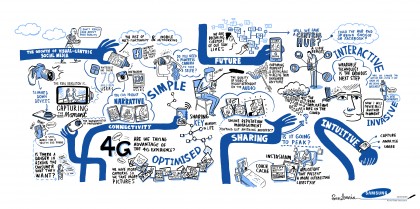Flashback: the past, present and future of the camera phone
You'll have definitely owned one of these phones
In the present day, it is clear that there has been a lot of technical advancement from the first VGA cameras to mega and Ultrapixels. Where does the future of mobile cameras lie? Where will the next innovation come from?
With the launch of the lower-megapixel cameras, some believe that the 'megapixel wars' are well and truly over, with users now hitting the top level that they would need for a picture.
However, that seems unlikely. We've seen plenty of smaller, faster and better cameras with an ever-increasing pixel count, and we're undoubtedly going to have at least five phones on the market in 2014 with 20MP+ sensors on.
HTC is unlikely to fall back in its pursuit of low-light excellence, so we expect the HTC One 2 to give a big upsurge in interest in this lower megapixel area.
During a a thought leadership discussion, set up by Samsung to discuss the future of the cameraphone, TechRadar spoke to a number of other parties with different views on where the smartphone was going.

Credit: Copyright Scriberia Ltd [2013] Unauthorised use strictly prohibited.
What was clear was that people now take photos with sharing in mind, meaning that high resolutions aren't going to be clamoured for when they will take longer to upload.
Get daily insight, inspiration and deals in your inbox
Sign up for breaking news, reviews, opinion, top tech deals, and more.
This was backed up byHenri Moissinac, EMEA Director for Facebook Mobile who confirmed that the "majority of posts to Facebook are now digital, opposed to the text of old".
What we will see is a lot of post processing at work, with the native files not making their way to the eyes of consumers before being run through stringent algorithms first.
This means that processor speed is also going to play a larger part in the future, meaning if you want to use a truly powerful cameraphone you'll need to have at least a decent brand of quad-core CPU, and 64-bit chips will help with this move too in three to four years' time.
It also became clear during the discussion that there was a move towards video sharing as well as image sharing. There are a lot more issues concerned with the production of video, including sound quality and editing, mimicking the worry that quality is being sacrificed in the rush to be most popular through one's online persona.
What an increase in video means for the future will be seen, but as sharing pictures and images becomes more and more important, expect greater emphasis to be placed on both camera hardware and software.
Moissinac also stated at the event that Facebook saw video becoming the next big thing to share - in the same way that HTC was putting an emphasis on being able to create video highlights, other will want to create a moving representation of their experience.
This will have a knock on effect to storage capacity, especially since 4K video capture is becoming more prevalent on the likes of the Galaxy Note 3.
"People have thousands of photos of their kids," added Moissinac. "They are trying to find on their hard drives moments of audio. I think the next battle will be about being able to track down those 15 seconds of useful audio in all the hours of audio on the hard drive."
So it seems that the future of the cameraphone isn't actually a lot to do with the sensor itself - it's providing the richer way to capture sound, keep memories and store it easily, either online or locally, as well as being able to pick out the special moments from the ever-increasing reams of content.
Lytro sensors, with the ability to refocus the image after taking, will becoming more prevalent too, as the notion of a flat, shiny image becomes something that's interactive and manipulable, using technology to open up vast corridors of picture ingenuity.
The notion of having a 100MP camera may come to fruition, but not in a linear scale - sharing will always be the front and centre, but technology involving image interpolation will lead to some clever ideas bringing sharper and better images to the larger and clearer displays we'll inevitably be carrying around in three to five years time.